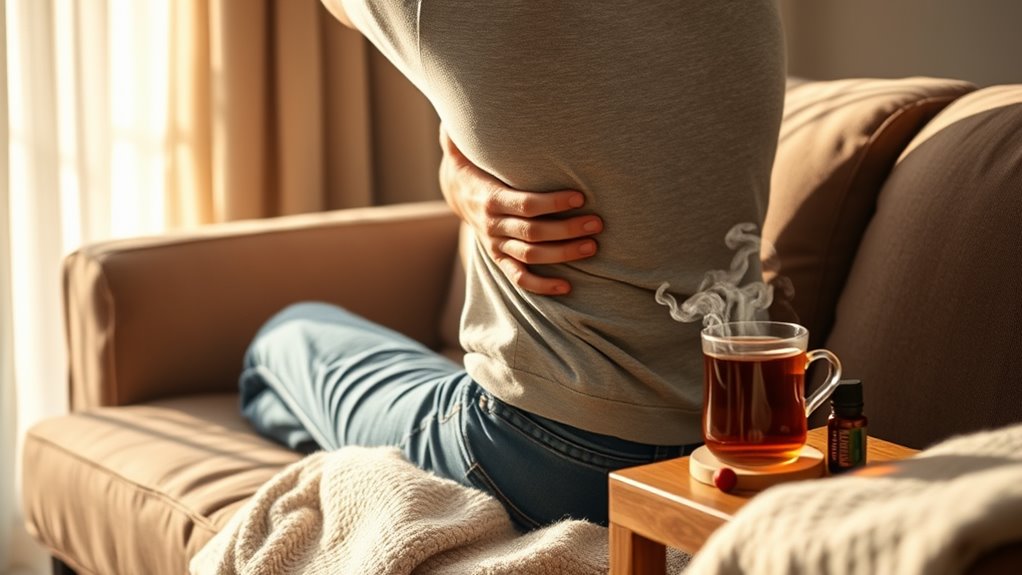Kidney Pain. Here’s What You Can Do at Home to Stop It Right Now!
If you’re dealing with kidney pain, stay hydrated—drink at least eight glasses of water daily to help flush out toxins. Applying heat with a heating pad or soaking in a warm bath can soothe discomfort. Make dietary changes by reducing sodium and protein intake while including more fresh fruits and veggies. If your pain worsens or you notice symptoms like fever or blood in your urine, it’s time to seek medical attention. There’s more helpful advice ahead!
Understanding Kidney Pain
Kidney pain can be a sharp reminder of how vital this organ is to your overall health. Understanding the sources of this pain is crucial for effective management. You might experience discomfort due to kidney stones, infections, or underlying conditions.
Recognizing the signs early can help you seek appropriate kidney pain relief instantly. Pay attention to associated symptoms like changes in urination, fever, or nausea. Identifying these indicators allows you to make informed decisions about your health.
Engage in proactive measures by monitoring your diet and lifestyle, as these factors can significantly impact kidney function. By grasping the complexities of kidney pain, you empower yourself to take action and alleviate discomfort effectively.
Your kidneys play a pivotal role—understanding their signals is key.
Importance of Hydration
Staying well-hydrated is a key factor in maintaining kidney health and alleviating kidney pain. When you drink enough water, you help your kidneys flush out toxins and waste products effectively. This reduces the risk of kidney stones and urinary tract infections, both of which can cause discomfort.
Aim for at least eight glasses of water daily, adjusting for factors like exercise and climate. If you’re experiencing kidney pain, increasing your fluid intake can help dilute your urine, making it less irritating.
Remember, hydration isn’t just about water; herbal teas and broths also contribute. Listen to your body; if you feel thirsty, it’s a signal to hydrate.
Prioritizing hydration is a simple yet powerful step toward better kidney health.
Heat Therapy for Relief
When you’re dealing with kidney pain, heat therapy can provide soothing relief. Applying heat helps to relax tense muscles and improve blood flow, reducing discomfort.
Here are three effective ways to harness heat therapy:
-
Heating Pad: Place a heating pad on your lower back for 15-20 minutes. Adjust the temperature to your comfort level to avoid burns.
-
Warm Bath: Soaking in a warm bath can help ease pain and promote relaxation. Add Epsom salts for added muscle relief.
-
Hot Water Bottle: Fill a hot water bottle and apply it to the affected area. The gentle warmth can alleviate pain and provide comfort.
Incorporate these techniques into your routine, and you’ll be on your way to easing kidney pain effectively.
Dietary Modifications
Making dietary modifications can significantly impact your kidney health and pain management.
Start by reducing sodium intake; excess salt can lead to fluid retention and increased pressure on your kidneys. Incorporate fresh fruits and vegetables, which provide essential nutrients and antioxidants that support kidney function.
Limit protein consumption, particularly red meats, as high protein can strain your kidneys. Opt for lean proteins like fish or poultry in moderation.
Stay hydrated with water, but balance your fluid intake based on your kidney condition.
Lastly, avoid processed foods rich in unhealthy fats and sugars.
Adopting these dietary changes not only alleviates kidney pain but also promotes overall well-being, empowering you to take control of your health journey.
Gentle Exercises and Stretching
Incorporating gentle exercises and stretching into your daily routine can significantly alleviate kidney pain and enhance overall wellness. Engaging in these activities promotes circulation, reduces tension, and supports kidney function.
Here are three effective exercises to get you started:
-
Cat-Cow Stretch: This yoga position helps relieve tension in your lower back and kidneys. Alternate between arching your back and rounding it to create a gentle flow.
-
Side Bends: Stand tall and gently lean to one side, feeling the stretch along your torso. Hold for a few breaths, then switch sides.
-
Walking: A brisk, short walk can boost circulation and help clear any stagnant energy in your body.
When to Seek Medical Attention
How can you tell if your kidney pain requires medical attention? If your discomfort intensifies or persists despite home remedies, it’s time to seek help.
Watch for symptoms like fever, chills, nausea, or vomiting, as these may indicate an infection. Blood in your urine or extreme pain radiating to your lower back or side can signal a more serious condition, such as kidney stones.
Additionally, if you experience swelling in your legs or ankles, it’s crucial to consult a healthcare professional.
Don’t ignore changes in urination patterns; a decrease in output or dark urine warrants attention.
Trust your instincts—if something feels off, seeking expert advice is always a wise choice for your health.
Frequently Asked Questions
Can Kidney Pain Be Mistaken for Back Pain?
Yes, you can easily mistake kidney pain for back pain. Both areas share nerve pathways, making it tricky. If you’re unsure, consider other symptoms or consult a healthcare professional for a definitive diagnosis.
Are There Specific Positions That Relieve Kidney Pain?
To relieve discomfort, try lying on your side with a pillow between your knees or sitting forward in a chair. These positions can help alleviate pressure and promote relaxation, giving you some immediate relief.
What Over-The-Counter Medications Can Help With Kidney Pain?
For managing discomfort, over-the-counter medications like ibuprofen or acetaminophen can help. You should always follow dosage instructions and consult a healthcare provider if symptoms persist or worsen. Staying hydrated is also essential for recovery.
Does Stress Affect Kidney Pain Levels?
Yes, stress can definitely impact your body’s pain response. When you’re stressed, your muscles tense up, and that tension can amplify discomfort. Managing stress through relaxation techniques can help reduce your overall pain levels significantly.
Can Kidney Pain Occur Without Any Other Symptoms?
Yes, kidney pain can occur without other symptoms. You might experience discomfort independently, but it’s essential to monitor changes and consult a healthcare professional for a thorough evaluation if pain persists or worsens.

